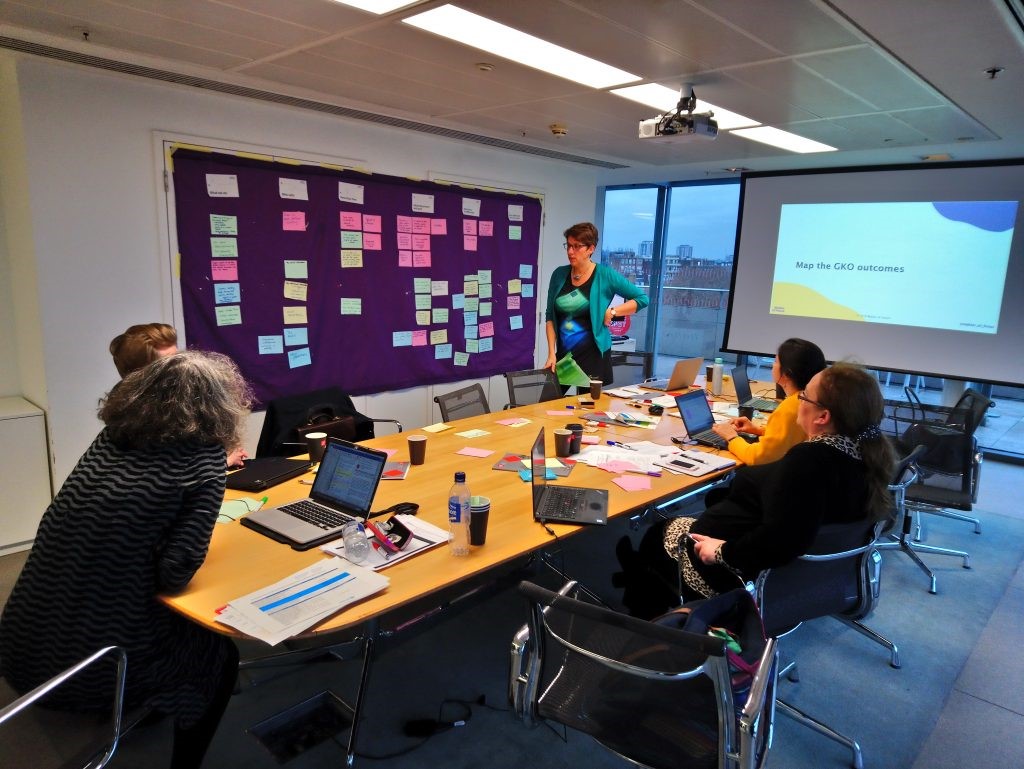Research may go through many changes in this process making it hard to trace its influence. On top of that, most people engaged in research impact activities are busy – being asked to track impact can feel like one job too many.
I faced these challenges in my role in knowledge mobilisation at the University of Edinburgh.
“Being asked to track impact can feel like one job too many.”
As someone involved in planning, delivering and supporting activities to help research influence society I became interested in how we might know if all of the exciting work to get people engaged with research was effective.
As I explored this (through an ESRC funded PhD), wider interest in research impact was building momentum. By the time I developed a framework for planning and tracking research impact1 and published from my PhD, the UK Research Excellence Framework (REF) impact assessment exercise was well underway and I supported many researchers through REF 2014.
Defining impact as a series of interlocked processes was an important foundation of the work and helped think beyond activities through to impact:
Research impact definition
- Research uptake: research users have engaged with research: they have read a briefing, attended a conference or seminar, were research partners, were involved in advising and shaping the research project in some way, or engaged in some other kind of activity which means they know the research exists.
- Research use: research users act upon research, discuss it, pass it on to others, adapt it to context, present findings, use it to inform policy, or practice developments.
- Research impact: changes in awareness, knowledge and understanding, ideas, attitudes and perceptions, and policy and practice as a result of research.
The challenge then is to trace impact through these levels and find the evidence to demonstrate that change has occurred and can be reasonably linked to research.
What I learned through my work at the university and have built on through supporting 100s of researchers and research initiatives since, is that a methodical focus on impact – from the start of a project, if possible – can help achieve more impact at the same time as setting up the framework to track and evidence that impact.
This is the sweet spot. Planning for impact and focusing on impact means we can combine being more impactful with generating evidence of that impact.
At Matter of Focus, we have a tried and tested method to understand and track the impact of research and knowledge to action projects. With experience of working with hundreds of researchers, and a track record of developing compelling impact reports for funders or exercises like the REF we know our approach can make tracking research impact manageable and do-able.
One of the things that sets our approach apart is that it has solid academic credentials. It builds on core concepts about how impact happens and how it can be assessed that are based on the research literature.
This means that rather than feeling like a technical process, our approach to understanding and tracking impact engages with what matters to you about your research impact work and helps you get to the heart of your specific contribution.
“…our approach to understanding and tracking impact engages with what matters to you about your research impact work and helps you get to the heart of your specific contribution.”
How we help you plan for and track research impact
- Educate on key concepts so that everyone understands the principles for planning and tracking research impact and can apply them to their own work.
- Support people to map out a pathway to impact, setting out how their research uptake activities will be delivered, how people will be engaged and involved, and how this will make a difference using our framework based on contribution analysis.
- Review existing data and feedback using the pathway as the lens. This usually includes basic data about stakeholders, feedback from interactions and testimonials.
- Define the most compelling impact story and what further data will be needed.
- Adapt, improve, refine and gather more data as the impact emerges over time.
We support people to do this through training, training capacity building, masterclasses, workshops and our impact-tracking software OutNav.
If you want to read more
1 Morton, S. (2015). Progressing research impact assessment: A ‘contributions’ approach Research Evaluation. 2015 October 1, 2015;24(4):405-19. https://doi.org/10.1093/reseval/rvv016
Gill Toms, Fiona Verity and Nick Andrews et al. Going DEEP: an evaluation of a social pedagogy-informed approach to evidence-enriched practice in social care. IJSP. 2024. Vol. 13(1). DOI: 10.14324/111.444.ijsp.2024.v13.x.001
Research and knowledge exchange on resilience and intimate partner violence: “Make Resilience Matter” for Children Exposed to Intimate Partner Violence Project: Mobilizing Knowledge to Action Using
a Research Contributions Framework. [Go to report (pdf)]
Knowledge to action in healthcare: ‘Developing a framework to evaluate knowledge into action interventions.’ [Go to report]
An assessment of the Global Kids Online programme: ‘Children’s experiences online: Building global understanding and action. [Go to report]

Mapping the contribution of the Global Kids Online programme.
